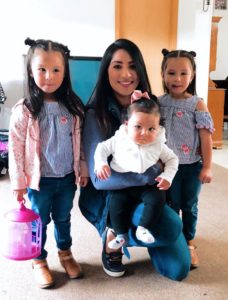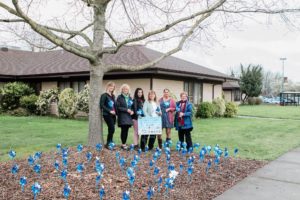Child Abuse Prevention: Words Matter
This month is National Child Abuse Prevention Month.
It is tough to think about the theme without getting a little bit sad because we all know of someone that as a child has struggled due to abuse. In the past, I thought of child abuse as being violent in physical form. Since becoming a parent and trying to be very engaged in learning how to be a solid parent, I have learned that child abuse has many angles. Abuse means to mistreat or improper use and neglect means to fail to care for properly. The one way that I have come to know and often see when I am out in the community is verbal abuse: when a parent tells a child something very hurtful.
Parenting is hard and learning how to communicate as a parent is serious work and an ongoing process. I am still learning and there has definitely been a lot of trial and error. I have read books, asked for advice, and attended parenting events, hoping to get more knowledge about what I should be doing as a parent. I want to acknowledge

that there is a fine line in being clear with expectations for your child and verbal abuse. It is our job as parents to guide, nurture and teach our children to become well-functioning adults. I really appreciate Dr. John Gottman’s research-based approaches to relationships. One of his studies include how to raise an emotional intelligent child. He highlights the four parenting styles, which include descriptions, as well as child and adolescent outcomes. According to Dr. Gottman, the best approach for parenting style is the “Emotion Coach Approach”. This approach validates a child’s emotions by respecting and being patient. This approach views this emotional intimacy as an opportunity to teach by guiding the child to problem solve. The parent coaches and does not tell the child how they should feel. This parenting approach has clear limits on behavior and helps the child by guidance, it does not dictate.
Verbal abuse is a hard one to identify and be aware of. I know from personal experience that if you grew up in a home where there was verbal abuse between parents, siblings, or in other relationships within the home, it becomes the norm. We then subconsciously conform to that standard and when others say things that are emotionally damaging we think it is normal. I haven’t always been very concrete in acknowledging what verbal abuse is and knowing what was said is not okay nor being able to stand up for myself. Having the ability to communicate respectfully and to stand up for yourself is a skill and can be achieved. Children are like sponges, if verbal abuse happens within the home and within relationships that children are around, they take that in. They can normalize it, speak to others in that same fashion, or be victims of verbal abuse. Verbal abuse is very damaging emotionally and confusing. Some examples of verbal abuse are:
-

Pinwheels for prevention. Name calling
- Judging and criticizing
- Accusing and blaming
- Threatening and manipulation
- Angry outbursts
- Hurtful jokes
I also want to include the antidotes of verbal abuse and list healthy ways to communicate:
- Honesty (having a safe place free from criticism)
- Respectful use of words
- Compassion and empathy
- Speak from I statements versus you (example, you did this sounds like an attack)
Like I said previously there are other types of abuse, you can read more about them here and here.
I acknowledge that although there is no perfect life and abuse can happen. Fortunately, there are ways to heal and be empowered through protective factors. Protective factors are ways to strengthen and build resiliency that are very effective and healing. The ones I am familiar with are related to an awesome project I get to work on Parent Cafes (I will blog about that another day). Parent Cafes use these factors learn more about oneself and build community:
Resiliency– the ability to be flexible in adapting and being able to spring back from life’s challenges
Relationships– positive social connections, individuals that are a good and healthy influence in your life
Support– solid supports that are reliable and concrete in times when you need it
Knowledge– being aware of where you are, who you are as a parent, and how your child is growing and developing (what is normal and not normal)
Communication– Being able to be socially and emotionally competent to communicate (ex. body language, word choices, tone)

I hope this helps. I will post links below if you are interested in reading more about abuse and resiliency. I also wanted to share some pictures of our department’s pinwheel garden that we did to bring awareness in the prevention of child abuse and to honor the fact that every child deserves a healthy, stable and joyous childhood. Thank you to Royce Markley for coming down from the Portland offices of Prevent Child Abuse Oregon to help make this happen!
Below are some opportunities to learn or to support efforts in the family:
Old Mill Center for Children & Families’ Annual Dinner & Auction
Saturday, May 4, 2019 click here for more information!
National Speaker to Address Linn-Benton Families – 6th Annual PSN Event!
Monday, May 20, 2019 click here for more information!
Center Against Rape & Domestic Violence – CARDV’s 17th Mother’s Day Weekend 5k
Saturday, May 11, 2019 OSU Austin Hall Quad click here for more information!
